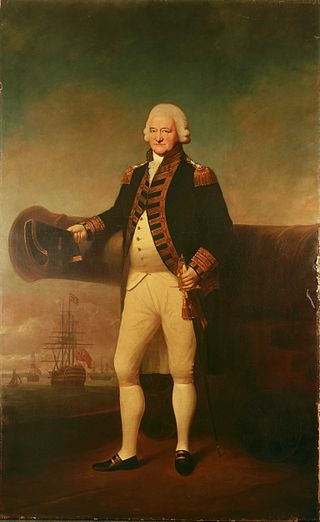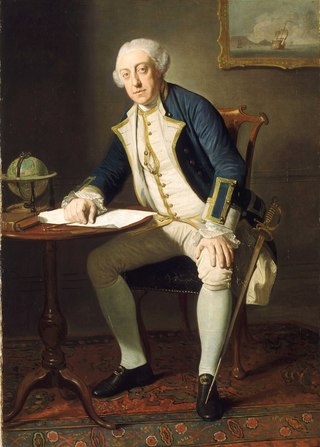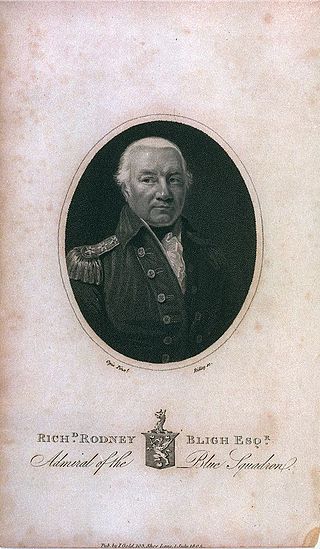
Admiral of the Fleet Sir Peter Parker, 1st Baronet was a Royal Navy officer. As a junior officer, he was deployed with a squadron under Admiral Edward Vernon to the West Indies at the start of the War of Jenkins' Ear. He saw action again at the Battle of Toulon during the War of the Austrian Succession. As captain of the fourth-rate HMS Bristol he took part in the Invasion of Guadeloupe during the Seven Years' War.

Admiral Philip Affleck was an admiral in the Royal Navy. He was the younger brother of Sir Edmund Affleck. Affleck held various commands throughout the latter half of the 18th Century, most notably as commander-in-chief of the Jamaica Station and as a Lord of the Board of Admiralty. Early in his career he fought at the Siege of Louisbourg where he was promoted commander after carrying out a successful cutting-out mission. He was promoted to post-captain a year later after impressing Admiral Edward Boscawen during the Battle of Lagos. Later in his career he joined Admiral Sir George Rodney in the West Indies and took part in the capture of Sint Eustatius. Between 1790 and 1792 he held the position of commander-in-chief of the Jamaica Station and between 1793 and 1796 he held his position as a Lord of the Board of Admiralty. Although his career was marked with long periods of inaction and unemployment Admiral Affleck was known as a good officer and was well respected by his peers.

Rear-Admiral Charles Holmes was a Royal Navy officer during the Seven Years' War, and was Wolfe's third-in-command during the capture of Quebec in 1759. He is also known for leading a British squadron up the River Ems in 1758, leading directly to the Capture of Emden.

Admiral of the Fleet Sir Chaloner Ogle KB was a Royal Navy officer and politician. After serving as a junior officer during the Nine Years' War, a ship he was commanding was captured by three French ships off Ostend in July 1706 in an action during the War of the Spanish Succession. Ogle was given command of the fourth-rate HMS Swallow and saw action against the pirate fleet of Bartholomew Roberts in the Battle of Cape Lopez in February 1722. The action was to prove a turning point in the war against the pirates and many consider the death of Roberts to mark the end of the Golden Age of Piracy.
Admiral The Hon. George Townshend was a British naval commander.

Vice-Admiral Sir Joshua Rowley, 1st Baronet was a Royal Navy officer who was the fourth son of Admiral Sir William Rowley. Sir Joshua was from an ancient English family, originating in Staffordshire (England) and was born on 1 May 1734. Rowley served with distinction in a number of battles throughout his career and was highly praised by his contemporaries. Unfortunately whilst his career was often active he did not have the opportunity to command any significant engagements and always followed rather than led. His achievements have therefore been eclipsed by his contemporaries such as Keppel, Hawke, Howe and Rodney. Rowley however remains one of the stalwart commanders of the wooden walls that kept Britain safe for so long.

Admiral Sir Richard Rodney Bligh, GCB was an officer of the Royal Navy. He saw service during the American War of Independence, as well as the French Revolutionary and Napoleonic Wars, eventually rising to the rank of admiral. He served as Commander-in-Chief, Jamaica Station and Commander-in-Chief, Leith.

Admiral Sir Edward William Campbell Rich Owen GCB GCH was a Royal Navy officer who went on to be Commander-in-Chief, Mediterranean Fleet. He was the son of Captain William Owen and elder brother of Vice-Admiral William Fitzwilliam Owen.
Sir William Burnaby, 1st Baronet was a British naval officer who became Commander-in-Chief, Jamaica Station.

Vice-Admiral Charles Stewart was an officer of the Royal Navy who saw service during the Nine Years' War, and the Wars of the Spanish Succession, Quadruple Alliance and Austrian Succession. He embarked on a political career, and was a Member of Parliament for the Parliaments of Ireland and Great Britain.

The Jamaica Station was a formation or command of the United Kingdom's Royal Navy stationed at Port Royal in Jamaica from 1655 to 1830.
Admiral Robert Montagu was a Royal Navy officer who became Commander-in-Chief of the Jamaica Station.
Vice-Admiral John Ford was a Royal Navy officer who served as Commander-in-Chief of the Jamaica Station.
Rear-Admiral Alexander Innes was a Royal Navy officer who became Commander-in-Chief of the Jamaica Station.
Vice-Admiral John Pakenham (1743–1807) was a Royal Navy officer who became Commander-in-Chief of the Jamaica Station.

Admiral William Parry was a Royal Navy officer who served as Commander-in-Chief of the Jamaica Station.

Vice-Admiral Thomas Davers was a Royal Navy officer who served as Commander-in-Chief of the Jamaica Station.
Rear Admiral William Smith was a Royal Navy officer who served as Commander-in-Chief of the Jamaica Station.

Vice Admiral Edward Hopson was a Royal Navy officer who served as Commander-in-Chief of the Jamaica Station.
Vice Admiral James Littleton (1668–1723) was a Royal Navy officer who served as Commander-in-Chief of the Jamaica Station.











